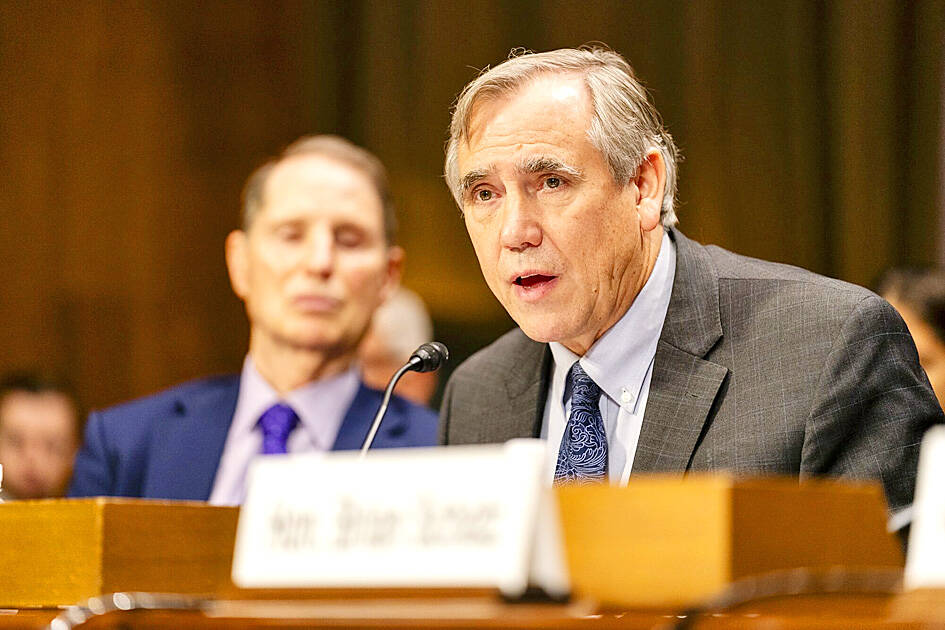Two US senators have reintroduced the Taiwan Relations Reinforcement Act, which they said is aimed at updating and bolstering US policy to support Taiwan amid China’s military and diplomatic aggression.
Republican Marco Rubio and Democrat Jeff Merkley on Tuesday introduced the act for the third time, after previous attempts in to get the legislation through Congress stalled.
In 2020, the bill was never included in the congressional agenda, while in 2021, it did not get further than the Senate Committee on Foreign Relations.

Photo: Bloomberg
“This bipartisan bill is more important than ever, as it reinforces our nation’s commitment to our democratic ally Taiwan, and strengthens our bilateral ties,” Rubio said in a joint news release with Merkley.
“Taiwan’s democracy is critical to peace and stability in the Indo-Pacific region. The United States’ support for Taiwan’s democracy plays a crucial role in defending that peace,” Merkley said.
If the bill were passed, it would change the status of the director of the American Institute in Taiwan to “representative,” and the representative’s appointment would have to be approved by the Senate, as is required for all US ambassadors.
It would also require the US president to establish an “interagency Taiwan task force” composed of senior government officials who would submit an annual report to Congress detailing actions that should be taken to enhance Taiwan-US relations.
Another provision would establish a nonprofit cultural exchange foundation, which would work with local governments and educational institutions to send US high-school and university students to Taiwan to study Chinese, history and politics.
The bill would also direct the US secretary of state to submit a report to Congress on how the US could work with Taipei to establish an alternative to China’s Confucius Institutes, which offer Chinese-language education courses globally.

The Taiwanese passport ranked 33rd in a global listing of passports by convenience this month, rising three places from last month’s ranking, but matching its position in January last year. The Henley Passport Index, an international ranking of passports by the number of designations its holder can travel to without a visa, showed that the Taiwan passport enables holders to travel to 139 countries and territories without a visa. Singapore’s passport was ranked the most powerful with visa-free access to 192 destinations out of 227, according to the index published on Tuesday by UK-based migration investment consultancy firm Henley and Partners. Japan’s and

NATIONAL SECURITY THREAT: An official said that Guan Guan’s comments had gone beyond the threshold of free speech, as she advocated for the destruction of the ROC China-born media influencer Guan Guan’s (關關) residency permit has been revoked for repeatedly posting pro-China content that threatens national security, the National Immigration Agency said yesterday. Guan Guan has said many controversial things in her videos posted to Douyin (抖音), including “the red flag will soon be painted all over Taiwan” and “Taiwan is an inseparable part of China,” while expressing hope for expedited “reunification.” The agency received multiple reports alleging that Guan Guan had advocated for armed reunification last year. After investigating, the agency last month issued a notice requiring her to appear and account for her actions. Guan Guan appeared as required,

Japan and the Philippines yesterday signed a defense pact that would allow the tax-free provision of ammunition, fuel, food and other necessities when their forces stage joint training to boost deterrence against China’s growing aggression in the region and to bolster their preparation for natural disasters. Japan has faced increasing political, trade and security tensions with China, which was angered by Japanese Prime Minister Sanae Takaichi’s remark that a Chinese attack on Taiwan would be a survival-threatening situation for Japan, triggering a military response. Japan and the Philippines have also had separate territorial conflicts with Beijing in the East and South China

A strong cold air mass is expected to arrive tonight, bringing a change in weather and a drop in temperature, the Central Weather Administration (CWA) said. The coldest time would be early on Thursday morning, with temperatures in some areas dipping as low as 8°C, it said. Daytime highs yesterday were 22°C to 24°C in northern and eastern Taiwan, and about 25°C to 28°C in the central and southern regions, it said. However, nighttime lows would dip to about 15°C to 16°C in central and northern Taiwan as well as the northeast, and 17°C to 19°C elsewhere, it said. Tropical Storm Nokaen, currently